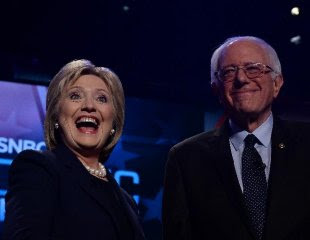
Photo Credit: AFP Photo/Jewel Samad
Much as I’ve liked Bernie Sanders, I never believed he’d be a stronger candidate than Hillary Clinton in the November run-off against the Republicans’ pick for president. I knew he polled better than her when pitted against the leading Republicans, but those polls didn’t factor in the red-baiting and hippie-baiting (Bernie being a child of both the ‘30s and ‘60s lefts) he’d be subjected to by a desperate GOP.
After all, the only remotely analogous campaign to Sanders’s in modern American politics was that of Upton Sinclair for governor of California in 1934. A lifelong socialist, Sinclair switched his registration from the Socialist to the Democratic Party in late 1933, stunned everyone by winning the Democrats’ gubernatorial primary the following summer, and looked poised to depose the unpopular Republican governor that November. One month before the election, however, virtually every newspaper in the state, and all the leading movie studios, began a concerted drive to bring “Uppie” down, distorting Sinclair’s beliefs and fabricating stories and newsreels showing how he’d ruin the state. Sinclair lost—and I feared that Sanders, though a far more seasoned and adept pol than Sinclair ever was, would meet a similar fate after being subjected to a kindred barrage.
But Tuesday’s Michigan primary made me rethink my beliefs on the relative strengths of the Bern and the Hill. A key reason for Sanders’s Michigan victory was his record of opposition to the trade deals of the past quarter-century, the deals that decimated the once-industrial Midwest. Sanders’s credibility on this issue can’t be challenged; voters understand that it’s part and parcel of his opposition to any policy that benefits capital at labor’s expense.
Nearly 60 percent of voters in Michigan’s Democratic primary believed (correctly) that trade deals had eliminated more jobs than they created. For that matter, 55 percent of voters in the state’s Republican primary believed the same. And not surprisingly, Sanders captured the lion’s share of the trade skeptics in the Democratic contest, as Donald Trump did in the Republican one.
Not just because they were misled by the polling, many in the media expressed surprise at the level of anger in both parties directed at the nation’s free trade policies of the past three decades. But the widespread rage at the offshoring of American manufacturing should have been apparent to anyone with a modicum of interest in how the other half lives. Even for those who didn’t wish to subject themselves to tours of abandoned factory towns, there have been surveys. This January, a poll conducted for the Roosevelt Institute and the Democracy Corps by Stanley Greenberg’s firm found that the percentage of independents who viewed NAFTA unfavorably exceeded those who viewed it favorably by 27 percent. Independent voters also opposed the proposed Trans-Pacific Partnership by a margin of 29 percent. Among Republicans, the negative views exceeded the positive ones by 23 for NAFTA and 33 percent for the TPP. No wonder Trump has brought new voters into the GOP primaries: He’s the first Republican candidate since the 1930s to voice an opposition to trade deals, even though that opposition is shared by a clear majority of GOP voters.
The overwhelming opposition by independents to U.S. trade policy is one secret of Sanders’s success. Fully 28 percent of voters in Michigan’s Democratic primary were independents, and they favored Sanders over Clinton, 70 percent to 28 percent. As the Democratic base has moved left on economic issues, including trade policy, Clinton has followed, shifting her position on the TPP from one of provisional support to one of belated opposition. But voters questioned the strength of her conversion, as they didn’t the strength of Sanders’s convictions.
It’s for this reason that I think Sanders has a good chance to win the upcoming primaries in Rust Belt states. I expect him to narrowly win Ohio next Tuesday, and Wisconsin and Pennsylvania in April. He has a fair shot at winning Missouri next week, and if he can pull an upset victory in Illinois—the state that often has been the decider in Democratic presidential contests—he could be said, for the first time, to be seriously challenging Clinton for the nomination.
I still think the odds are considerably against a Sanders nomination. But Michigan has made me rethink the relative strengths of Clinton and Sanders in the general election. Sanders’s greater ability to mobilize white working class votes in the Rust Belt states makes him a stronger candidate to win those states against Trump, who has already demonstrated an ability to bring more working class whites to the polls than any Republican in decades. Should the Republicans nominate Trump, he would put Ohio, Wisconsin, Michigan, and Pennsylvania in play—four states that Bill Clinton and Barack Obama carried in their presidential bids; four states that this year’s Democratic nominee can’t win without.
Would Hillary run stronger than Bernie in some other demographic groups and states? Doubtless she would, but Michigan has made me think that his margin over hers in the Midwest and with the white working class would likely exceed her edge in different parts of the country and with different blocs. Latinos are likely to come to the polls in record numbers to vote against Trump no matter who the Democrats nominate. The gender gap will work to the Democrats’ advantage with either Hillary or Bernie as their nominee. The same pragmatism that has led many African Americans to support Clinton over Sanders would lead them to support Sanders over Trump.
That’s why I now think Sanders would be the stronger Democrat in November. And yet, not 24 hours after Michigan changed my mind, an exchange in Wednesday night’s Democratic debate exposed a new Sanders’s Achilles’s heel. Asked by one of the moderators why he had said somewhat favorable things about Fidel Castro 35 years ago, and asked to explain—as he’s done before—how he differentiated democratic socialism from communism, he responded as if answering the question would be an affront to his anti-imperialist beliefs and a repudiation of commitments past. He passed up the chance to differentiate his democratic socialism from authoritarian or totalitarian communism—something I’ve heard him do on several occasions—and chose to say why he’d opposed American support for the Contras and the Bay of Pigs invasion, acknowledging only in passing that it would be a welcome development if Cuba embraced democracy.
This was leading with his chin—so much so that Clinton, who’s not raised Sanders’s more radical past before, pounced, questioning why he hadn’t repudiated a left dictatorship. It’s a good question: One can oppose the kind of imperial interventions that have defined the U.S. relations with Latin America and still condemn those left-wing regimes that have held power through force. Sanders’s reluctance to do that would open him to savage attacks in a general election—attacks that might not have much impact among younger voters, but could sway some older swing voters. I don’t believe this line of attack would enable Trump to defeat Sanders at the ballot box, but it could make things uncomfortably close. And needlessly so, since nothing is stopping Sanders from drawing a clearer distinction between democratic and authoritarian socialism.
So do I still think Bernie would be the stronger Democrat in November? I do—but not by anything close to a country mile.
Harold Meyerson is the executive editor of The American Prospect. His email is hmeyerson@prospect.org.














